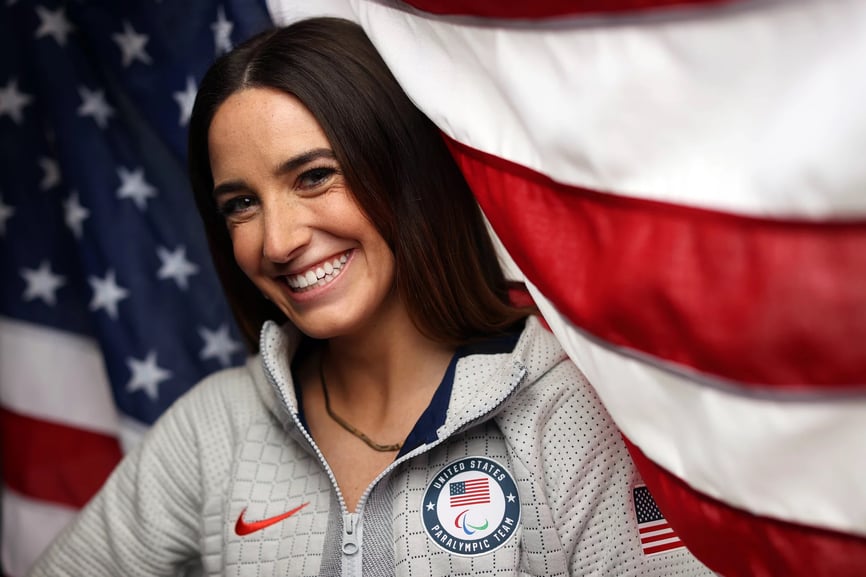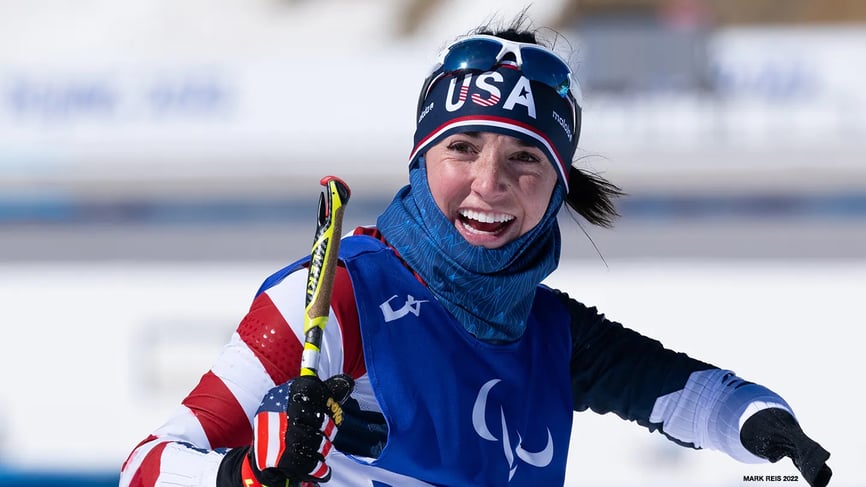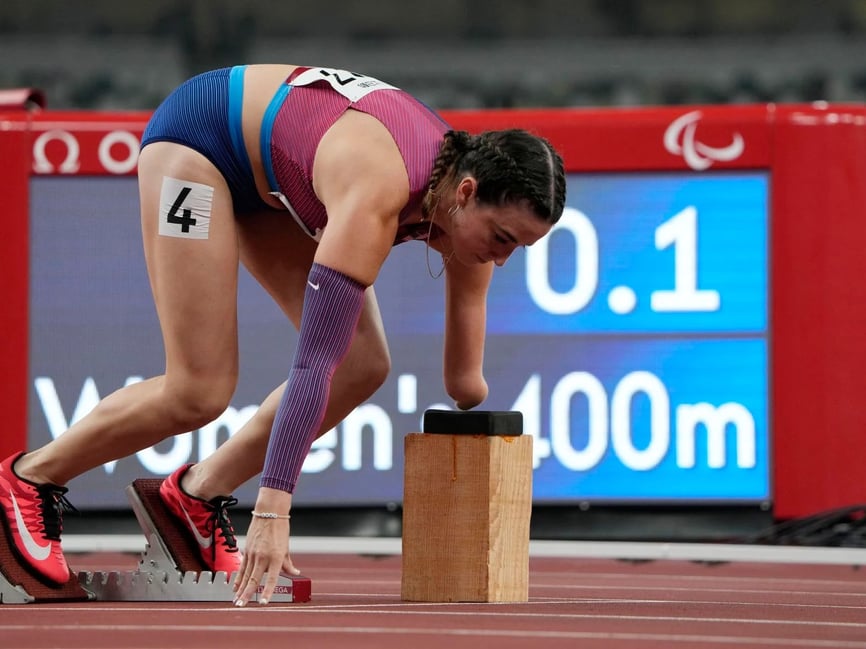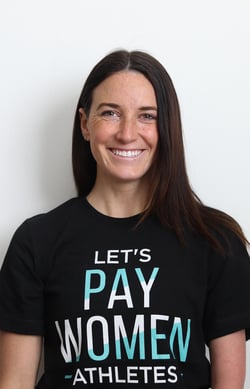
Photo credit: Getty Images
Dani Aravich is a humble powerhouse. The multi-hyphenate athlete represented the U.S. at last year's Tokyo Paralympic Games in track and field, then immediately pivoted to make Team USA again for the Beijing Winter Games in para skiing and biathlon. We spoke with the 25-year-old ahead of her second Paralympic appearance.
In 2019, you decided to go for both the summer and winter Paralympic Games. Even before the pandemic caused them to be rescheduled, that was an incredibly ambitious goal. How did you mentally approach taking on such big aspirations?
When I started this journey, I didn't know enough about what I was getting into.
For example, for each Paralympic Games cycle, you don't know how many athlete slots are going to be allocated, you don't know if there's a new up-and-coming person that could knock you out... I didn't fully understand all the variables and what it takes. In my head, I thought "I'll go for Tokyo," but then after I got introduced to skiing I was like, "Okay, I'll go and try to make the team for Beijing, but after that, I'll probably be done."
I thought of [training for two Paralympic Games] as a way to prove to myself that I'm capable of dedicating myself, and really achieving something higher athletically than I ever felt like I was able to in high school or college.
But now that I've qualified, my mindset has changed a little bit. Now I'm thinking, "How many years can I do this for? Can I last until I'm 40?"
Your background is in cross country and track and field. How did you get involved in skiing?
I was introduced to Nordic skiing in December of 2019, and for the remainder of that winter before the pandemic hit, I would ski every once in a while but my focus was on the summer Games. I thought I had more time. Then when the pandemic hit and everything got shut down, I started integrating roller skiing into my training. I knew rescheduled dates meant I would have limited time between the summer and winter Games.
The real reason I'd say I was able to qualify for Beijing is because the U.S. national team invited me to train with them in Bozeman, Montana. Without their support, I don't think I would've been able to reach this level in that amount of time.
How did you stay focused during setbacks?
There have been many moments when I wanted to give up!
It's really hard being relatively new at something, like skiing, and getting thrown in at a very high level. I was going to some of these international skiing competitions and placing second-to-last, sometimes last. I'm lucky in that I have really good coaches and staff members that provide me with a reality check of, "You've only been doing this for two years. The fact that you're even here is important." I have to look at things from a long-term perspective.
As for running, which was my background, I wanted to quit after my first para race in the spring of 2019! This happened after just a few months of training. I was running the 400m and with 10 meters left, I tripped and fell on my own shoe or something. I was still working full time, so I thought that maybe this running thing would be a short stint. I could go back to my regular job and focus on what I think I'm “supposed” to be doing after college, but luckily I stuck it out for a little bit longer.

Photo credit: Getty Images
How has your outlook on careers changed since becoming a professional athlete?
I was raised on the fact that you went to college to get a job, to work till you're 65, to retire, and then you’d have enough money in the bank that you'd be fine for the rest of your life. That 9-5 corporate life sounded pretty miserable to me. It also isn't guaranteed.
Obviously, that's a path that works for a lot of people, but I hope people know that it isn't the only option.
It sounds so cheesy, but if you're passionate about something and willing to dedicate everything and make sacrifices with your time, social life, habits, money... With a lot of hard work and some luck, there can be financial opportunities in whatever that passion may be.
I wish I'd known when I was younger that I didn't have to take the exact same career path that I saw my parents, friends, and classmates take. I've been lucky that I've found a way to live out my passions while working. I still work in professional sports, like I did right after college, I'm just no longer on the business side of it.

Photo credit: AP
How did your Tokyo Paralympic Games experience prepare you for Beijing?
For pandemic purposes, I don't know what I expected but Tokyo wasn't what I expected, if that makes sense. Competing at the Games was an experience that was very overwhelming for me. I'm incredibly grateful looking back on it, but in that moment after competing, it was hard to view my experience positively. I didn't know how to deal with the pressure. I bottled up my emotions and months later they all exploded.
I think I'm now better prepared to handle everything. I also have teammates that I'm close with and staff that I've known for some time.
I think the extreme highs and lows are one thing that Paralympic and Olympic athletes don't talk about enough. Sometimes it's the people who win gold, too, who are experiencing that emotional toll. It's just this feeling of complete emptiness when it's all done.
You know you'll start a new competition season and that maybe there's another chance to go to the Games. You know you'll have other things on the horizon to keep you motivated. But for a period of time after the conclusion of your event or the Games as a whole, you're kind of just floating through life, not really sure how to talk to people about what you experienced.
I hope that people are willing to share what they go through post-Games. That was definitely something that I didn't feel ready for.
What's something you would tell other young and aspiring athletes?
I would say, "collect experiences and use them to be a more valuable asset in whatever you do." Because I had real work experience prior to becoming a professional athlete, I see myself as a uniquely valuable asset to a future sponsor or employer. I never want to be put in the box of "she's just an athlete," or "she's just an employee."
I still work 20-30 hours a week in the business world. I like having multiple aspects of my life and feeling secure in my ability to take care of myself. I know that all of these experiences are making me a more well-rounded person, and that can only help me in the future.
Lastly, if you could add another Paralympic sport to your repertoire, summer or winter, what would it be?
I am very intrigued by para triathlon. I've never swam competitively before so I'd have a lot of work to do there. Hopefully, I'll get to do some experimenting with it this summer. I definitely have interest in that and in cycling, or para cycling, because I need to do something of a longer distance [than running the 400m].
Dani's highest finish in Beijing was 4th in the women's cross-country skiing sprint standing (free) semi-finals. You can follow her on Instagram at @theonearmdan.
This interview has been edited and condensed for clarity.

